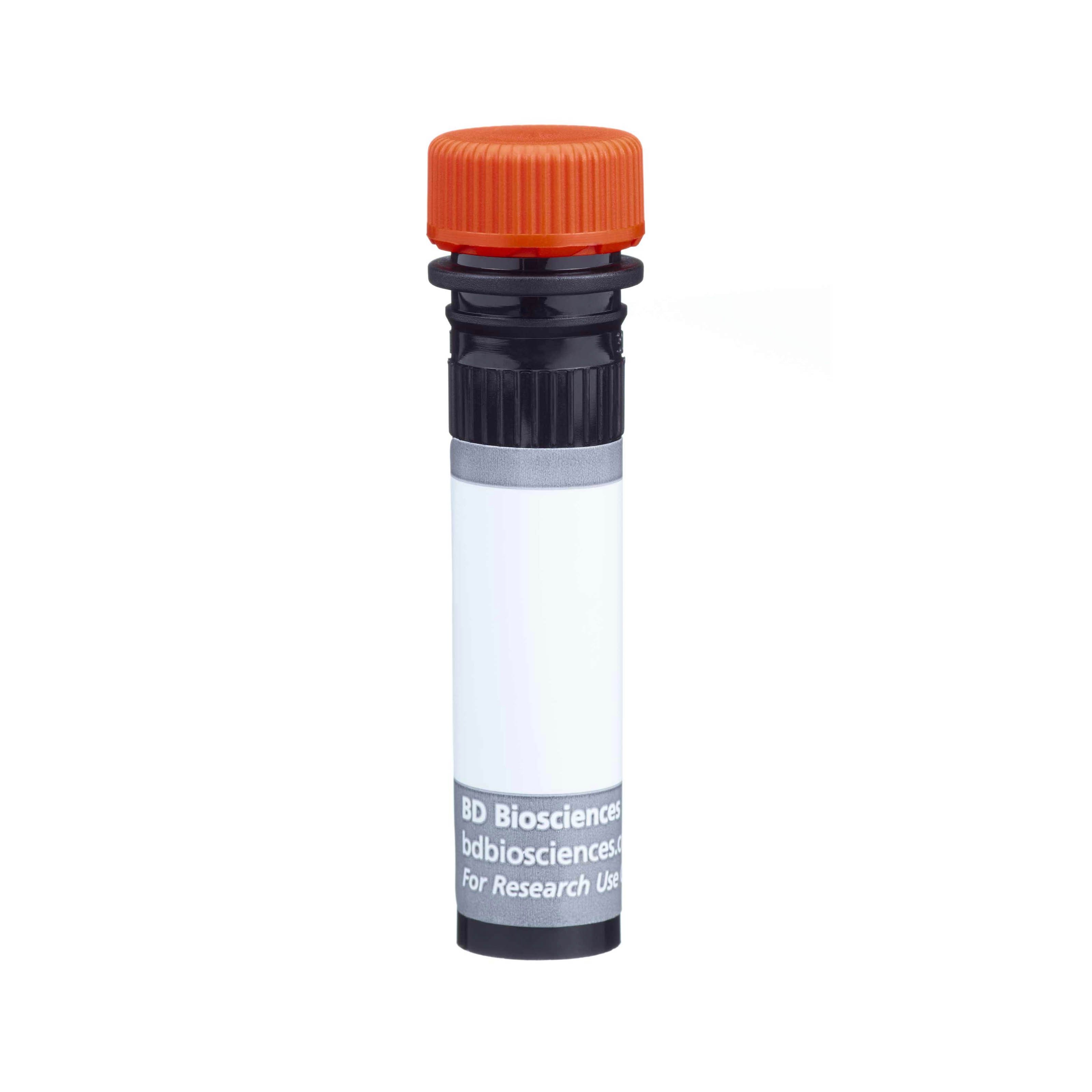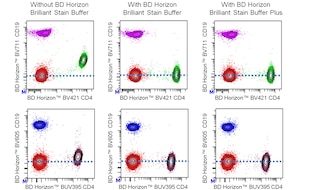Old Browser
This page has been recently translated and is available in French now.
Looks like you're visiting us from {countryName}.
Would you like to stay on the current country site or be switched to your country?


Regulatory Status Legend
Any use of products other than the permitted use without the express written authorization of Becton, Dickinson and Company is strictly prohibited.
Preparation And Storage
Recommended Assay Procedures
BD™ CompBeads can be used as surrogates to assess fluorescence spillover (Compensation). When fluorochrome conjugated antibodies are bound to BD CompBeads, they have spectral properties very similar to cells. However, for some fluorochromes there can be small differences in spectral emissions compared to cells, resulting in spillover values that differ when compared to biological controls. It is strongly recommended that when using a reagent for the first time, users compare the spillover on cells and BD CompBead to ensure that BD CompBeads are appropriate for your specific cellular application.
For optimal and reproducible results, BD Horizon Brilliant Stain Buffer should be used anytime two or more BD Horizon Brilliant dyes are used in the same experiment. Fluorescent dye interactions may cause staining artifacts which may affect data interpretation. The BD Horizon Brilliant Stain Buffer was designed to minimize these interactions. More information can be found in the Technical Data Sheet of the BD Horizon Brilliant Stain Buffer (Cat. No. 563794/566349) or the BD Horizon Brilliant Stain Buffer Plus (Cat. No. 566385).
Note: When using high concentrations of antibody, background binding of this dye to erythroid cell subsets (mature erythrocytes and precursors) has been observed. For researchers studying these cell populations, or in cases where light scatter gating does not adequately exclude these cells from the analysis, this background may be an important factor to consider when selecting reagents for panel(s).
Product Notices
- The production process underwent stringent testing and validation to assure that it generates a high-quality conjugate with consistent performance and specific binding activity. However, verification testing has not been performed on all conjugate lots.
- Researchers should determine the optimal concentration of this reagent for their individual applications.
- An isotype control should be used at the same concentration as the antibody of interest.
- Caution: Sodium azide yields highly toxic hydrazoic acid under acidic conditions. Dilute azide compounds in running water before discarding to avoid accumulation of potentially explosive deposits in plumbing.
- For fluorochrome spectra and suitable instrument settings, please refer to our Multicolor Flow Cytometry web page at www.bdbiosciences.com/colors.
- Please refer to www.bdbiosciences.com/us/s/resources for technical protocols.
- BD Horizon Brilliant Stain Buffer is covered by one or more of the following US patents: 8,110,673; 8,158,444; 8,575,303; 8,354,239.
- Please refer to http://regdocs.bd.com to access safety data sheets (SDS).
- CF™ is a trademark of Biotium, Inc.
- BD Horizon Brilliant Ultraviolet 615 is covered by one or more of the following US patents: 8,110,673; 8,158,444; 8,227,187; 8,575,303; 8,354,239.
Companion Products






The OX-34 antibody reacts with CD2 (LFA-2), a member of the immunoglobulin superfamily. In the rat, CD2 is expressed on thymocytes, T lymphocytes in spleen and lymph node, dendritic epidermal T cells, splenic macrophages, and NK cells, but not on B cells, most intestinal intraepithelial lymphocytes, or peritoneal and liver macrophages. CD2 can associate with the T-cell receptor complex, and it may function in both intercellular adhesion and signal transduction. In the rat, CD48 and CD59 have been identified as ligands for CD2. OX-34 mAb binds to the extracellular portion of CD2, and it blocks the binding of CD2 to CD48. While OX-34 antibody does not activate T cells, it partially blocks activation by immobilized mAbs to CD3 (clone G4.18) and αβ T-cell receptor (clone R73), and it partially inhibits allogeneic mixed lymphocyte reactions. Moreover, in vivo administration of OX-34 antibody depletes peripheral T cells and prevents allograft rejection.
The antibody was conjugated to BD Horizon BUV615 which is part of the BD Horizon Brilliant™ Ultraviolet family of dyes. This dye is a tandem fluorochrome with an Ex Max near 350 nm and an Em Max near 615 nm. BD Horizon Brilliant BUV615 can be excited by the ultraviolet laser (355 nm) and detected with a 610/20 filter and a 595 nm LP. Due to the excitation of the acceptor dye by the blue/yellow-green laser line, there may be significant spillover into channels detecting PE-CF594 like emissions (eg, 610/20-nm filter).

Development References (11)
-
Beyers AD, Spruyt LL, Williams AF. Molecular associations between the T-lymphocyte antigen receptor complex and the surface antigens CD2, CD4, or CD8 and . Proc Natl Acad Sci U S A. 1992; 89(7):2945-2949. (Biology). View Reference
-
Brown MH, Preston S, Barclay AN. A sensitive assay for detecting low-affinity interactions at the cell surface reveals no additional ligands for the adhesion pair rat CD2 and CD48. Eur J Immunol. 1995; 25(12):3222-3228. (Biology). View Reference
-
Clark SJ, Law DA, Paterson DJ, Puklavec M, Williams AF. Activation of rat T lymphocytes by anti-CD2 monoclonal antibodies. J Exp Med. 1988; 167(6):1861-1872. (Biology). View Reference
-
Elbe A, Kilgus O, Hünig T, and Stingl G. T-cell receptor diversity in dendritic epidermal T cells in the rat. J Invest Dermatol. 1993; 102:74-79. (Biology). View Reference
-
Fangmann J, Schwinzer R, Wonigeit K. Unusual phenotype of intestinal intraepithelial lymphocytes in the rat: predominance of T cell receptor alpha/beta+/CD2- cells and high expression of the RT6 alloantigen. Eur J Immunol. 1991; 21(3):753-760. (Biology). View Reference
-
Hirahara H, Tsuchida M, Watanabe T, et al. Long-term survival of cardiac allografts in rats treated before and after surgery with monoclonal antibody to CD2. Transplantation. 1995; 59(1):85-90. (Biology). View Reference
-
Jefferies WA, Green JR, Williams AF. Authentic T helper CD4 (W3/25) antigen on rat peritoneal macrophages. J Exp Med. 1985; 162(1):117-127. (Immunogen: Flow cytometry, Functional assay, Immunoaffinity chromatography, Immunoprecipitation, Inhibition). View Reference
-
Liversidge J, Dawson R, Hoey S, McKay D, Grabowski P, Forrester JV. CD59 and CD48 expressed by rat retinal pigment epithelial cells are major ligands for the CD2-mediated alternative pathway of T cell activation. J Immunol. 1996; 156(10):3696-3703. (Biology). View Reference
-
Williams AF, Barclay AN, Clark SJ, Paterson DJ, Willis AC. Similarities in sequences and cellular expression between rat CD2 and CD4 antigens. J Exp Med. 1987; 165(2):368-380. (Biology). View Reference
-
van den Brink MR, Hunt LE, Hiserodt JC. In vivo treatment with monoclonal antibody 3.2.3 selectively eliminates natural killer cells in rats. J Exp Med. 1990; 171(1):197-210. (Biology). View Reference
-
van der Merwe PA, Brown MH, Davis SJ, Barclay AN. Affinity and kinetic analysis of the interaction of the cell adhesion molecules rat CD2 and CD48. EMBO J. 1993; 12(3):4945-4954. (Biology). View Reference
Please refer to Support Documents for Quality Certificates
Global - Refer to manufacturer's instructions for use and related User Manuals and Technical data sheets before using this products as described
Comparisons, where applicable, are made against older BD Technology, manual methods or are general performance claims. Comparisons are not made against non-BD technologies, unless otherwise noted.
For Research Use Only. Not for use in diagnostic or therapeutic procedures.
Report a Site Issue
This form is intended to help us improve our website experience. For other support, please visit our Contact Us page.